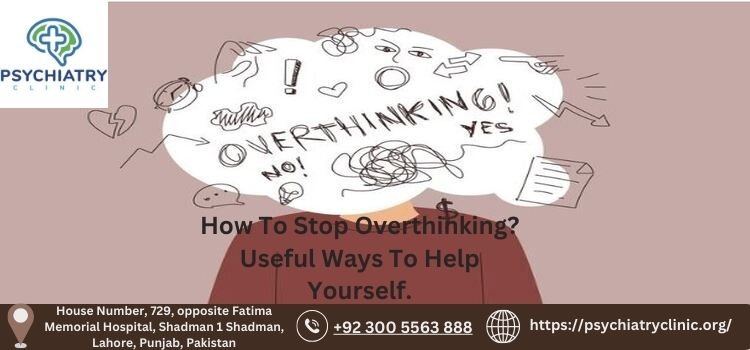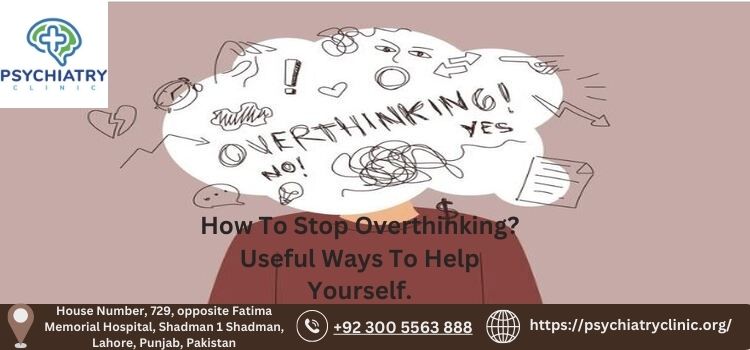How To Stop Overthinking? Useful Ways To Help Yourself.Comprehensive Guide
Many people who pass through the stressful journey start overthinking the question arises how to stop overthinking? Now explore how to stop overthinking Useful Ways To Help Yourself. There are many different ways that one can stop overthinking. One of the most effective ways to do so is by recognizing that there is a problem and taking action. This could involve seeking help from a therapist, practicing mindfulness techniques, or making lifestyle changes.
In this blog post, we will explore all these ways.
Let’s dive in to get more details.
How To Stop Overthinking? Useful Ways To Help Yourself.

Here we discuss how To Stop Overthinking. Useful Ways To Help Yourself. Overthinking can be a powerful force that takes over our minds and causes us to worry excessively about every little thing in our lives. It can lead to anxiety, stress, and even depression if it is left unchecked.
That’s why it’s important to learn how to stop overthinking before it becomes a bigger issue. In this comprehensive guide, we will explore some useful ways to help yourself stop overthinking. These methods have been proven to be effective in managing and reducing overthinking.
Recognizing The Problem
The first step in stopping overthinking is acknowledging and recognizing that it exists. Oftentimes, we may not even realize that we are overthinking until it has already consumed our thoughts. Once you have identified this behavior, you can start taking steps to address it.
Moreover, it is essential to understand the root cause of your overthinking. Is it triggered by specific events or situations? Are there underlying anxieties or fears that are fueling your overthinking? Identifying and understanding these triggers can help you develop better-coping mechanisms.
Is overthinking the same thing as worrying?
While overthinking and worrying may seem like the same thing, there are some subtle differences. Overthinking involves dwelling on a situation or problem for an extended period and often leads to excessive analysis and rumination. On the other hand, worry is more focused on potential future events and usually causes feelings of unease or fear.
However, both overthinking and worrying can be detrimental to our mental health if left uncontrolled. The good news is that the strategies we will discuss in this guide can help address both of these issues.
Some Common Overthinking Symptoms to Look Out For
Some common overthinking symptoms to look out for are given below:
- Replaying conversations or events in your head repeatedly
- Feeling overwhelmed by “what-ifs”
- Difficulty making decisions
- Trouble sleeping due to racing thoughts
- Constantly seeking reassurance from others
If you experience any of these symptoms, it may be a sign that you are overthinking. It’s crucial to address these symptoms before they escalate into bigger issues.
Practice Mindfulness Techniques
Practicing mindfulness can help you stay in the present moment and stop your mind from wandering into overthinking. Mindfulness is a form of meditation that focuses on being fully present and aware of your thoughts, feelings, and surroundings.
One simple mindfulness technique is deep breathing. Take a few minutes each day to sit comfortably and focus on your breath. You can also try incorporating mindfulness into your daily activities, such as eating, walking, or even showering. Doing so can help you stay grounded and calm your mind when it starts to wander.
Types of Overthinking and How to Cope
There are different types of overthinking, which can vary from person to person. Here are some common types and ways to cope with them:
Catastrophizing:
This involves imagining the worst-case scenarios in a situation. To cope with this type of overthinking, try reframing your thoughts and focusing on more realistic outcomes.
Analysis Paralysis:
This is when you get stuck in a cycle of analyzing and overanalyzing a situation, leading to decision-making difficulties. To break out of this cycle, try setting deadlines for decisions and accepting that not all choices will be perfect.
Rumination:
This type of overthinking involves replaying past events or conversations and dwelling on them. To cope with rumination, try acknowledging your thoughts and then redirecting your focus to the present moment. You can also try journaling as a way to process your thoughts and emotions.
Make Lifestyle Changes
Sometimes, our daily habits and routines can contribute to overthinking. Making some lifestyle changes can help you break out of this pattern.
Practice self-care:
Take breaks when needed and prioritize activities that bring you joy and relaxation.
Get enough sleep:
Lack of sleep can make your mind more susceptible to overthinking. Aim for 7-9 hours of sleep each night.
Exercise regularly:
Physical activity can help reduce stress and promote a more positive mindset.
Limit screen time:
Constant exposure to social media and news can fuel overthinking. Try limiting your screen time and unplugging from technology when you feel overwhelmed.
How to Get Rid of Overthinking?
Apart from practicing mindfulness, there are other ways to get rid of overthinking as well.
Challenge Your Thoughts
It’s common for our minds to jump to worst-case scenarios and “what-ifs” when we start overthinking. To combat this, try challenging your thoughts by asking yourself if they are based on facts or assumptions. Look for evidence that supports or refutes your thoughts. This can help you break the cycle of overthinking and find a more balanced perspective.
Engage in Physical Activities
Engaging in physical activities such as exercise, sports, or even going for a walk can help stop overthinking. Not only does it keep your mind occupied, but it also releases endorphins that can boost your mood and reduce stress and anxiety.
Identify Your Destructive Thought Patterns
Destructive thought patterns can keep us stuck in a cycle of overthinking. Some common ones include catastrophizing, black-and-white thinking, and personalization. Identifying your destructive thought patterns can help you become more aware of them and work on challenging or changing them.
Take Control of Your Story
Ultimately, we have control over our own thoughts and actions. Instead of letting overthinking control you, try taking control of your story. Practice positive self-talk, focus on the present moment, and set realistic expectations for yourself.
Focus More on the Solution
Lastly, it can be helpful to focus more on finding solutions rather than dwelling on the problem. Overthinking can often cause us to spiral into negative thoughts and feelings, but by focusing on finding a solution, we can break free from this cycle.
Seek Professional Help
If overthinking is significantly impacting your daily life and well-being, don’t hesitate to seek professional help. A therapist or counselor can provide you with personalized strategies and support to manage your overthinking.
Conclusion
Explore How To Stop Overthinking? Useful Ways To Help Yourself. Overthinking is a common struggle for many people, but it doesn’t have to consume your life. By recognizing the problem, practicing mindfulness, making lifestyle changes, and seeking professional help if needed, you can learn how to stop overthinking and take control of your thoughts and emotions.
Remember to be patient with yourself and trust in the process – it may take time, but you will eventually find peace from overthinking. So, don’t hesitate to try out these strategies and techniques and see what works best for you. You deserve to live a life free from overthinking.
FAQs
Frequently asked questions by people.
How do I stop overthinking useless things?
One way to stop overthinking is by practicing mindfulness techniques, such as deep breathing and focusing on the present moment. You can also try challenging your thoughts and finding solutions instead of dwelling on the problem.
What is the best treatment for overthinking?
The best treatment for overthinking may vary from person to person. Some people find relief through therapy or counseling, while others may benefit from medication.

